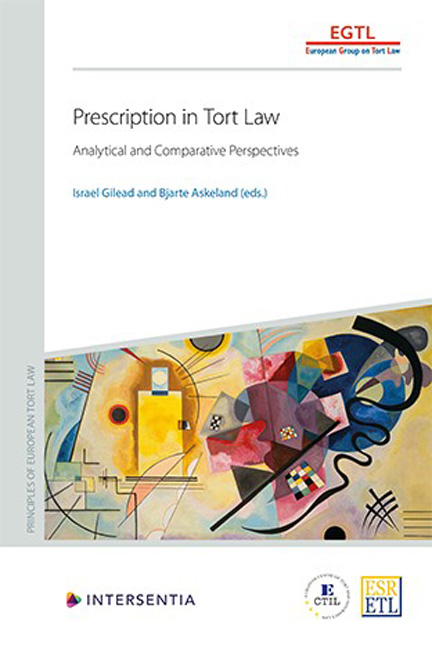Book contents
- Frontmatter
- Dedication
- Acknowledgements
- Contents
- List of Authors
- PART I THEORETICAL AND COMPARATIVE ANALYSES
- Analytical and Comparative Report
- Economic Analysis
- PART II PRESCRIPTION IN TORT LAW OUTLINED
- Case Scenarios
- Austria
- Belgium
- Czech Republic
- England and Wales
- France
- Germany
- Greece
- Italy
- The Netherlands
- Norway
- Poland
- South Africa
- Spain
- Switzerland
- United States
- European Union
- Appendix: Questionnaire
- About the Editors
Italy
Published online by Cambridge University Press: 22 December 2020
- Frontmatter
- Dedication
- Acknowledgements
- Contents
- List of Authors
- PART I THEORETICAL AND COMPARATIVE ANALYSES
- Analytical and Comparative Report
- Economic Analysis
- PART II PRESCRIPTION IN TORT LAW OUTLINED
- Case Scenarios
- Austria
- Belgium
- Czech Republic
- England and Wales
- France
- Germany
- Greece
- Italy
- The Netherlands
- Norway
- Poland
- South Africa
- Spain
- Switzerland
- United States
- European Union
- Appendix: Questionnaire
- About the Editors
Summary
INTRODUCTION
Prescription is a legal arrangement linking certain legal effects to the passage of time: specifically, in civil law it indicates the phenomenon whereby a subjective right is extinguished if its holder does not exercise that right within a legally-prescribed amount of time. The standard's purpose is to preserve the predictability of legal relations.
The roots of prescriptions are found in ancient roman law. Already during the Roman Republic (between 509 bc and 27 bc) Pretors had imposed time limits for the exercise of the formulae (the‘procedura formulare ‘). Yet a general legal framework can be found only in the era of Justinian (527 ac– 565 ac) when the principle of longi temporis praescriptio is upheld. Such a framework was incorporated in Italian law by the civil code of 1865 (CC)– art 2105 –, proposing a unitary definition of the institute of prescription that combines both the so-called acquisition and the extinctive model. The civil code of 1942 in force– arts 2934 ff– adopts this distinction, translating the acquisition model in the institute of usucapione (acquisition of property by prescription) and the extinctive model into the generic institute of prescription. After the entering into force of the Republican constitution of 1948, the constitutionality of the institute of prescription was raised; specifically, it was assumed to be incompatible with existing constitutional rights. However, the constitutional court decision of 10 June 1966, n 63 confirmed its constitutionality as a means to ensure the legal certainty, which involves any right, including constitutionally guaranteed ones.
DEFINITION OF PRESCRIPTION
In Italian law, the limitation period is governed by arts 2934 ff of the civil code. It is defined as an extinction of rights resulting from the failure to exercise them within a period of time prescribed by law. Italian law, privileging the certainty of legal relations, requires rightholders to exercise their rights within a set time frame, and continued disinterest in exercising one's rights justifies the rights‘extinction.
The civil code regulates the period of prescription: unless the law provides otherwise, the‘ordinary‘prescription period is ten years: rights not exercised within ten years will be automatically extinguished (art 2946 CC).
- Type
- Chapter
- Information
- Prescription in Tort LawAnalytical and Comparative Perspectives, pp. 413 - 448Publisher: IntersentiaPrint publication year: 2020



